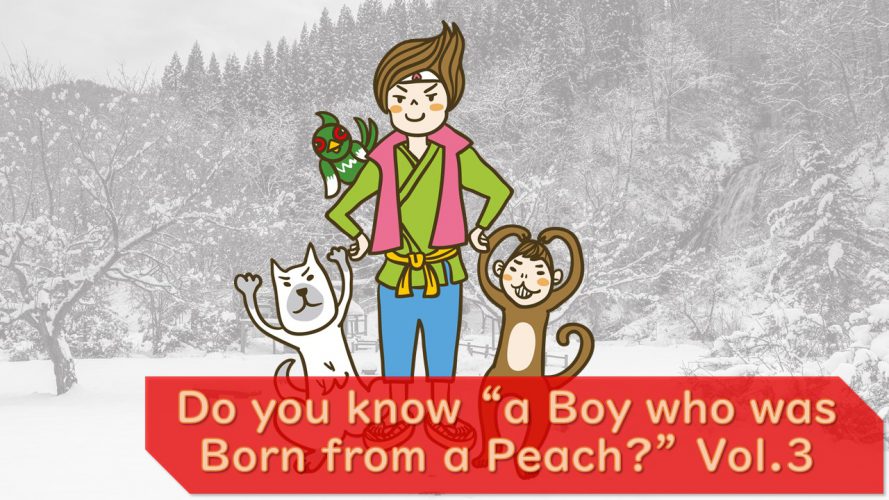JAPANESE LESSON
Do you know “a Boy who was Born from a Peach?” Vol. 3

Today, let’s read a Japanese famous old tale, “桃太郎(ももたろう).” You may know this story as “Peach boy.”
This is a series of the story “桃太郎(ももたろう)” and I recommend you to check the the previous lesson before you read this.
Last time, 桃太郎 grew up and decided to defeat demons. Today, 桃太郎 sees some animals. It’ll be easier to read because it repeats the same sentences.
Let’s read the third part of the story in Japanese and learn Japanese.
旅(たび)の途中(とちゅう)、桃太郎(ももたろう)は犬(いぬ)に会(あ)い、
In the middle of the trip, Momotaro saw a dog.
「桃太郎(ももたろう)さん、袋(ふくろ)の中(なか)に何(なに)が入(はい)っているだい(1)。」
“Momotaro, what do you have in your bag?”
「日本一(にほんいち)のきび団子(だんご)だよ。」
“The best kibidango in Japan.”
「僕(ぼく)に一(ひと)つくれればお伴(とも)します。」
“If you give me one, I’ll follow you.”
犬(いぬ)は桃太郎(ももたろう)から一(ひと)つ団子(だんご)をもらい家来(けらい)になりました。
Dog got a kibidango from Momotaro and became a retainer.
桃太郎(ももたろう)と犬(いぬ)が歩(ある)いて行(い)くと、猿(さる)がやってきて、
While Momotaro and Dog were walking, a monkey came.
「桃太郎(ももたろう)さん、袋(ふくろ)の中(なか)に何(なに)が入(はい)っているんだい。」
“Momotaro, what do you have in your bag?”
「日本一(にほんにち)のきび団子(だんご)だよ。」
“The best kibidango in Japan.”
「僕(ぼく)に一(ひと)つくれればお伴(とも)します。」
“If you give me one, I’ll follow you.”
猿(さる)は桃太郎(ももたろう)から一(ひと)つ団子(だんご)をもらい家来(けらい)になりました。
Monkey got a kibidango from Momotato and became a retainer.
しばらく行くと、キジが飛(と)んできて、
After they went for a while, a pheasant flew to them.
「桃太郎(ももたろう)さん、袋(ふくろ)の中(なか)に何(なに)が入(はい)っているんだい。」
“Momotaro, what do you have in your bag?”
「日本一(にほんいち)のきび団子(だんご)だよ。」
“The best kibidango in Japan.”
「僕(ぼく)に一(ひと)つくれればお伴(とも)します。」
“If you give me one, I’ll follow you.”
キジは桃太郎(ももたろう)から一(ひと)つ団子(だんご)をもらい家来(けらい)になりました。
Pheasant got a kibidango from Momotaro and became a retainer.
Note
(1) 袋(ふくろ)の中(なか)に何(なに)が入(はい)っているだい
In English, the translation will be “What do you have in your bag?” and the subject of the sentence is “you.”
Here, Momotaro has something in his bag.
In Japanese language, however, something is in his bag. The subject is “something.” It’s kibidango here.
Like this, in Japanese language, they use things as a subject more compared with English.
This is why they use passive expression many times even in English.
This is the third part of “桃太郎.” He got four retainers in the middle of the trip.
We have 2 more parts for this story.
I recommend you to read the story aloud in Japanese as a practice.
I hope you are looking forward to the continuation.

Leave a Comment